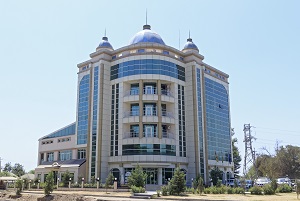
Trade can be a powerful engine of growth, creating new opportunities for investment, job creation and development. However, for some countries, efforts to capitalize on this potential are undermined by the lack of adequate regulatory frameworks, which can inflate transaction costs, limit export competitiveness and dampen entrepreneurship.
As the latest step in its support to trade facilitation reforms in Tajikistan, UNECE has undertaken a scoping mission to Dushanbe, jointly with the International Trade Centre (ITC) and the UN Conference for Trade and Development (UNCTAD) with the aim of bolstering support to bring about fundamental changes to the country’s trade facilitation regime. This scoping mission, in the context of the UNECE project ‘Supporting the removal of regulatory and procedural barriers to trade in Tajikistan‘, follows-up on the recommendations of the UNECE Study on Procedural and Regulatory Barriers to Trade undertaken at the request of Tajikistan.
The study, completed in 2014, stipulated a number of recommendations on trade facilitation reforms for the Central Asian country, including the establishment of the Coordination Committee on Trade Facilitation (CCTF). With the Committee now in place, this project, in connection with the ITC trade facilitation support programme in the country, plans to sustain the Committee’s efforts to deliver on the country’s commitments under the World Trade Organization’s (WTO) Trade Facilitation Agreement (TFA). The project is expected to enhance the capacity of public and private stakeholders’ members of the Committee, to identify gaps and develop approaches to deepen the country’s integration into regional and global value chains.
The findings of the 2017 UNECE Report on Trade Facilitation and Paperless Trade show that the average implementation of surveyed trade facilitation and paperless trade measures for Tajikistan is about 51%, which is higher than the Central Asian average of 41%, but substantially lower than the UNECE regional average of 69%. The survey shows that while the country is advancing on transparency and formalities measures, it needs to make stronger efforts in relation to cross-border agencies cooperation and paperless trade.
Among the priorities for reducing the cost and time of doing trade for Tajikistan are the reduction, simplification and harmonization to international standards of trade documents, the establishment of an authorized economic operator system, the issuance and acceptance of electronic copies of trade documents, the cross-border exchange of certificates such as certificates of origin and Sanitary and Phytosanitary (SPS) Certificates, and the establishment of an electronic Single Window.
The mission team met the First Deputy Minister of Economic and Trade Development of Tajikistan, Mr. Zavqizoda Zavqi Amin, Chair of the CCTF, and the Secretary of the Committee, as well as representatives of the Donors Coordination Committee on Trade Facilitation (with partners including GIZ, OSCE, UNDP, USAID, SECO and ADB) to discuss the project’s planned activities and coordinate efforts.
As a result, UNECE plans to execute project activities during 2018, in close cooperation with the Ministry of Economic Development and Trade, the CCTF of Tajikistan and partner organizations. This will involve the conducting of a gap analysis in relation to the implementation of WTO TFA measures and the development of a roadmap for trade facilitation in the country, with action plans for the prioritized measures, including policy recommendations and a monitoring mechanism to measure progress. The project will conduct consultation workshops with the CCTF members and working groups to discuss and validate its outcomes. This will be based on the UNECE Guidelines for Developing a National Trade Facilitation Roadmap and the UNCTAD Empowerment Programme for national trade facilitation committees approach.